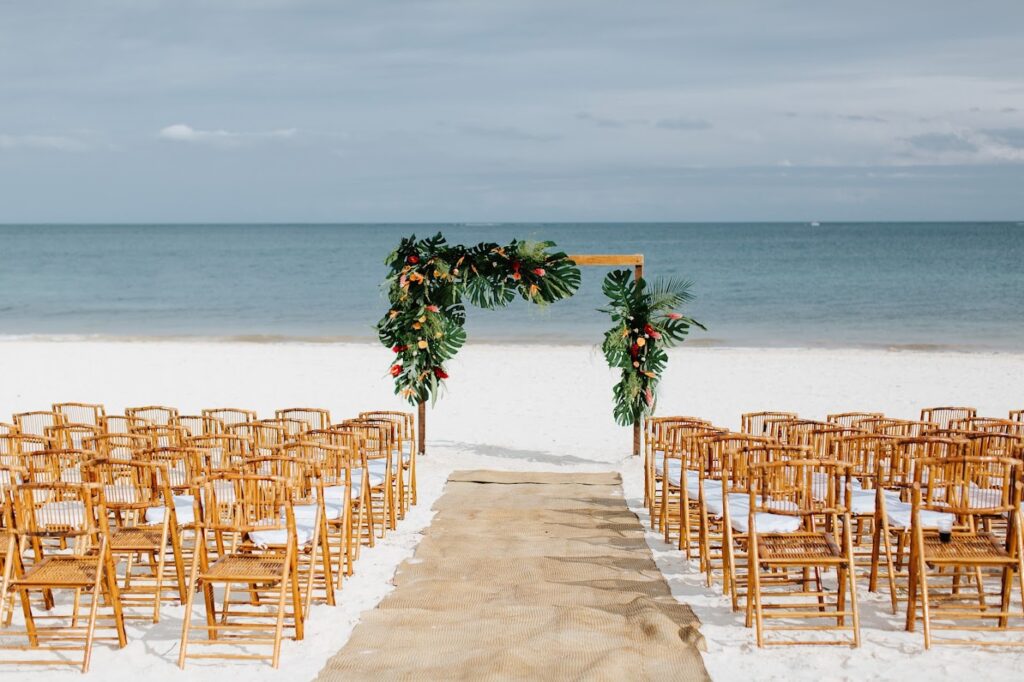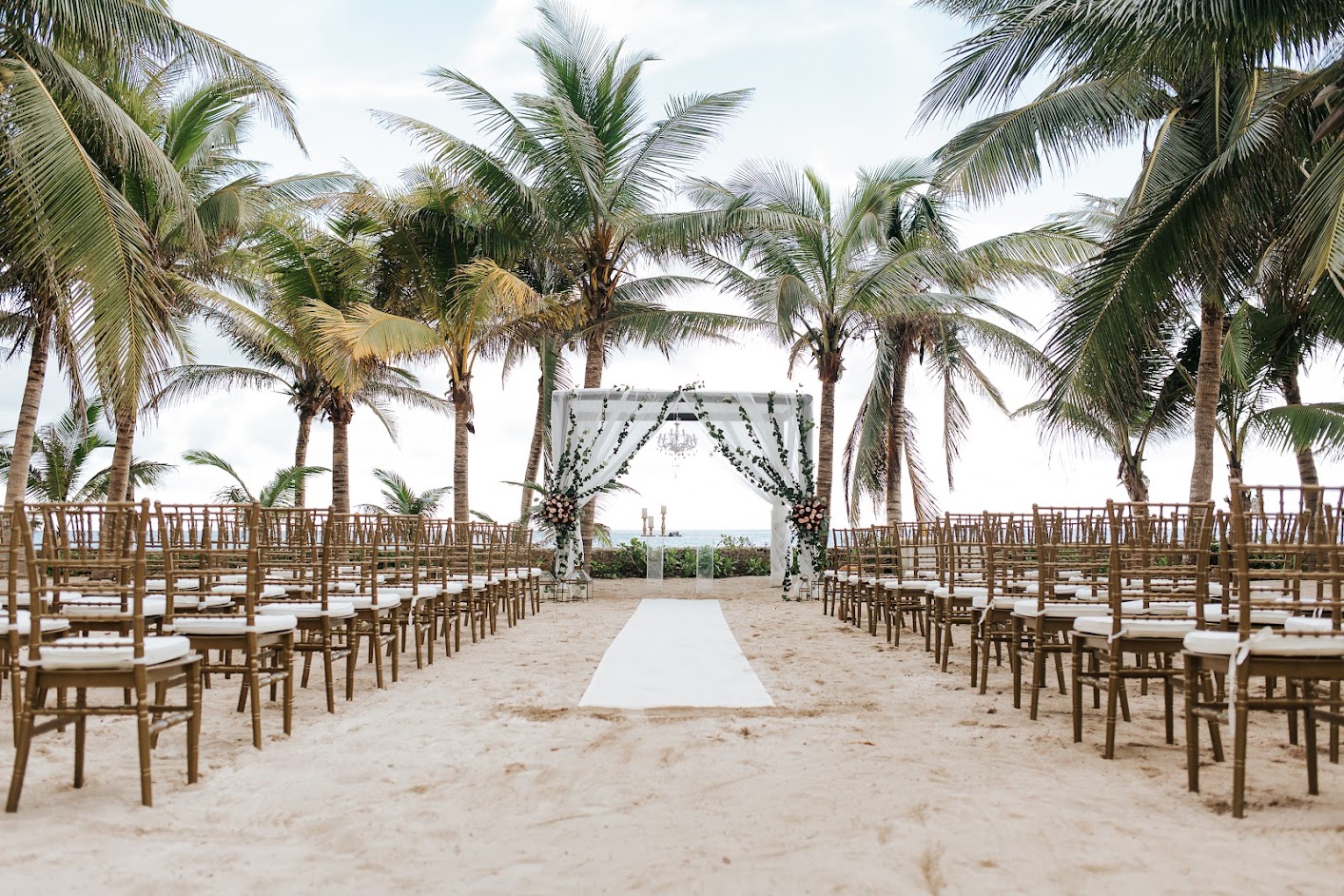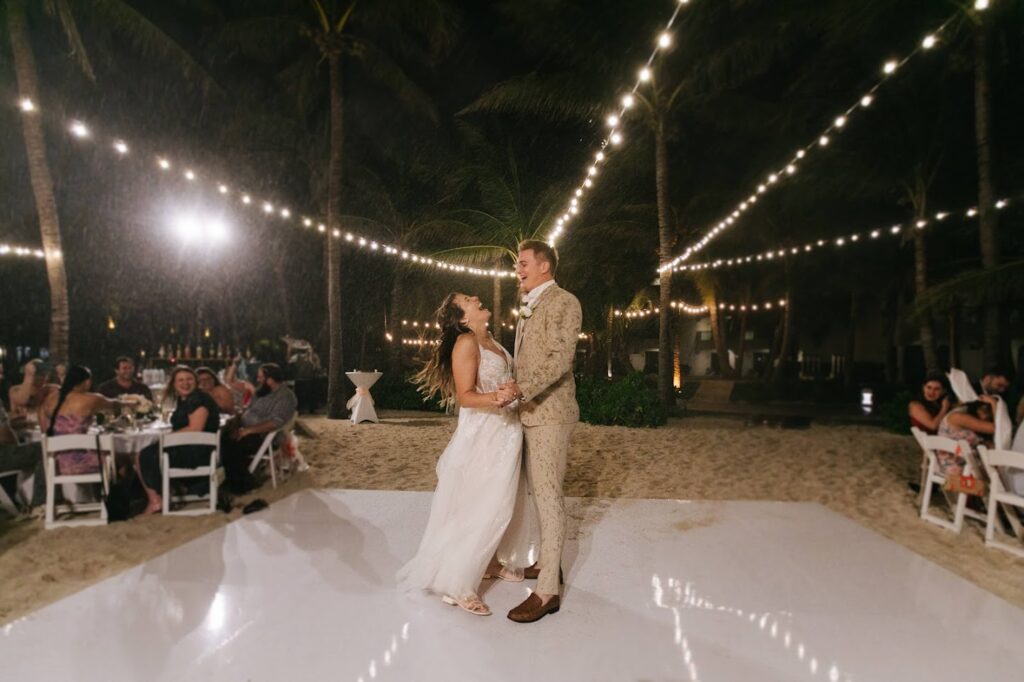
Planning a destination wedding can be an exciting adventure, but it also comes with its own set of challenges and considerations. Although in a lot of ways it can be easier than a stateside wedding because you aren’t having to manage aspects like catering, multiple outside vendors, entertainment, lodging, or transportation, it still requires a certain level of planning. And, honestly, one of the hardest parts of navigating that planning is the unknown. As I’ve said in the past, there just aren’t as many resources out there for a destination wedding, so a lot of couples are left trying to fill in the gaps of planning by creating a sort of hodgepodge of tools they’ve gotten from social media, their travel agent, or other random sources.
The driving purpose behind Breezy Brides is to help ease couple’s minds as they plan their destination wedding that they’re making the best decisions with the most information possible. So we’re going to take about all about the do’s and don’ts of planning a destination wedding. We’ll go over essential tips for couples planning a destination wedding, including budgeting, legal requirements, guest accommodations, and communication with vendors. The biggest “do’s” I can recommend that will make your planning easier, and some “don’ts” to avoid as they may cause unnecessary stress for you or your guests.
Powered by RedCircle
The Do’s
Do #1 – Start Planning Early
Starting off strong with my number one recommended “do” would be to start planning early. For most destination weddings I recommend at least 12 to 18 months in advance, especially if you’re choosing a popular or remote location or resort. Many factors contribute to why this is the sweet spot for planning your destination wedding.
Factor one would be availability. Especially if you’re considering very popular locations like Cancun or Riviera Maya, or popular resorts like Dreams Playa Mujeres or Secrets Akumal, these resorts book fast and far in advance, so securing your date is the top priority to start.
Factor two would be ample time to save and budget properly. We’ll get to more about the budget later, but giving yourself less than a year to afford a destination wedding may be too little time, especially if you’re expecting a large group.
Factor three as to why I recommend 12 to 18 months to plan is to be able to book outside vendors of your choice. If you’re considering hiring an outside photographer, videographer, hair & makeup, or florists, especially at the most busy time of year for destination weddings, these vendors can also book up very quickly. If you have your heart set on a specific aesthetic that a photographer shoots you’ll want to make sure they have your date available well in advance.
Factor four would be to not limit yourself on travel logistics. What I mean by this is giving you and your guests ample time to obtain a passport if needed and book flights at a reasonable cost. If you aren’t sending save the dates or invites until less than 6 months out and some of your guests don’t have a passport yet, they have to be on the ball to get one right away. Giving them more time takes the stress away from you and them and gives plenty of time to obtain a passport in time.
Also, regarding the flights, this is obvious enough. If you’re planning less than 6 months out, you should be looking at them well in advance to know which dates work best to travel, what layovers may look like, what airport may be best to fly out of, etc.

Do #2 – Set a Realistic Budget
If you’ve been around a while, you’ve heard me talk about this more than once. I completely understand how it can be an overwhelming task to start, as typically most couples have no idea what wedding packages cost, what the add-on fees are, what to expect with nightly rates or travel. If you haven’t checked them out already, make sure to read our other posts, “Your Destination Wedding Budget – 16 Must Have Items” and “The Hidden Costs of a Destination Wedding.”
These will help you determine the biggest expenses for your destination wedding and what you can expect to actually spend depending on if you want to have a more budget friendly wedding, or have a larger budget to accommodate for a larger guest list and more extensive add-ons for décor and vendors.
Do #3 – Plan Guest Accommodations
In short, this means securing a room block at your resort, providing round trip transportation, and some sort of itinerary or event schedule.
I’ve touched on the importance of a room block, but let’s go over the basic reasons why they are so important. Most importantly, they guarantee inventory for your entire group. As long as you get enough rooms they are yours until the due date passes. This means that even if your guests wait until the last minute to book their trip, as long as they do it with your travel agent before the due date, their room is guaranteed. Without a room block, if they wait until the last minute to book, especially at a popular resort, they could be completely sold out or sold out of the most affordable rooms.
As far as transportation goes – a very frequent question we get from couples and guests is “How do I get from the airport to the resort?” We take care of round trip transportation for all guests, and right on our booking form are options to book shared, private or luxury round trip transportation. This takes the guess work away from the guest and ensures they have safe and reliable transportation to and from the resort.
Lastly, providing an itinerary or event schedule is extremely helpful to guests. Remember, they may view your wedding as a vacation as well, so they may want to plan excursions or their own plans outside of your wedding events. Providing an itinerary on your website to include all the dates and times for not only your wedding day, but any welcome parties, rehearsal dinners, or group excursions gives your guests peace of mind knowing exactly when everything is that they need to attend, and also lets them know when they can do anything on their own.
Do #4 – Provide Clear Communication to Guests
Keep in mind this might be the first time any of your guests have traveled internationally, attended an all-inclusive resort, or a destination wedding, so the entire process can seem very foreign and intimidating to them.
A few ways to help with this would be providing clear communication like sending save-the-dates and invitations well in advance, and providing detailed information to them via a website. I typically recommend sending save the dates 12-18 months before the wedding, and invitations about 8 months before the wedding, but I know some couples lately have chosen to forego the save-the-dates and just send any invitation. In that case I recommend around 12 months for just invitations.
If you book through me, we create a wedding website for all of our couples where all your guests would go to submit their reservation. It also has detailed information about the resort, reservation and payment due dates, wedding events, and transportation. Not only that, but once a guest makes their reservation they also receive communication from us throughout the entire process. Giving them payment reminders, their itinerary, and detailed information regarding travel, transfers, and anything else pertaining to their trip.
If you’d like to see a sample of our couple’s website take a look here: The Smith & Jones Wedding.

Do #5 – Visit the Venue in Person (If Possible)
Now, I want to preface this with the fact that I do not think it’s absolutely necessary, and in fact, a lot of couples choose not to strictly for budget reasons, but if you have the financial means to do so – visiting the venue beforehand can make your planning process less stressful in the long run.
If it is possible, a site visit allows you to physically see the venues you chose for your wedding day, making sure they’re the ones you want. It also allows you to meet with the on-site wedding coordinator and take care of things you may not be doing until a few months before the wedding. You can do a food or cake tasting, select décor options, and even look at room categories you’re considering booking. A lot of resorts also offer an incentive for doing an inspection trip where they reduce the cost of the wedding expenses by a certain amount if you book through them to see the resort beforehand.
I don’t want to worry couples who do not plan on seeing the resort and venue beforehand, because like I said, most couples do not and everything works out perfectly. But this is a small “do” I would consider if it’s possible for you.
Don’ts
Okay, we’ve gotten the do’s of planning a destination wedding taken care of. Now, perhaps more importantly, let’s talk about the don’ts. You may notice that some of these are the opposite of the do’s we talked about already, but sometimes explaining what could go wrong by not doing them is more of a motivation.
Don’t #1 – Underestimate Costs
Destination weddings have a reputation of being cheaper than traditional weddings, and don’t get me wrong, a lot of the times they most definitely are. But of course, there’s a lot of nuances and factors that contribute to your wedding budget. It’s not always best to assume that just because you’re having a destination wedding it will be cheaper than having one at home.
This depends on a lot of factors like your guest count, wedding date, and what your actual budget is. For example, if you’re trying to stay under $10,000 but are expecting 80+ guests at your wedding, you either have to have a fairly basic wedding package, décor, and only a few add-on’s. This is mainly to do the added fees associated with a guest count that’s greater than what the wedding package covers. If the resort is only covering 50 guests in the package and charges $80 per person over that, you can be paying an additional $4,000 if you’re expecting a 100 guest wedding.
In the same breath, if you want the same budget of $10,000 and your guest count is closer to 30 guests, that it more realistic and gives you more wiggle room with certain add-on’s that aren’t included in your package that may be important to you, like an outside photographer or live band.
This is also not considering the comps and incentives resorts offer either, so if we’re looking at the same budget again, but you chose a resort with low to middle rates and great comps and incentives, you could actually be getting a substantial refund back at the end of your wedding trip that will offset a lot of those wedding expenses.
That is all to say, “don’t” assume your destination wedding is going to be cheap just for the fact that it’s a destination wedding. Try to do as much research as you can on estimated wedding costs, with the help of your travel agent, to make sure you’re giving yourself a realistic budget and wedding based on your needs.

Don’t #2 – Leave Planning to the Last Minute
Moving on to the 2nd don’t of the do’s and don’ts of planning a destination wedding – don’t leave planning to the last minute. This coincides with the do of starting your planning early, but let’s talk about what happens if certain aspects of your destination wedding planning are left until the last minute.
Most importantly, leaving planning to the last minute just adds stress to your wedding experience. It’s simply not worth it to cram as many wedding tasks in as possible in a short time because you won’t have a fun or enjoyable experience. It will begin to feel like a stressful task instead of enjoying the process.
Aside from added stress, leaving planning to the last minute will potentially cause you to not get the date, resort or vendors you’re hoping for. If you’re set on something specific they simply might not be available anymore, and that can put a huge damper on your wedding experience.
Don’t #3 – Neglect Guest Experience
As mentioned earlier, this may be the first time some of your guests have travelled internationally or attended a destination wedding, so they may need some reassurance on their decision to come. For example, what exactly happens if you don’t secure a room block, transportation or have a general schedule for them?
Not having a room block means the resort could sell out before guests are ready to book and they don’t have a guaranteed reservation, so ensuring that you have one in place takes the worry and stress away from you and them by allowing them to book when it’s convenient for them before the due date. They don’t have to worry about the resort selling out of certain room categories or altogether.
Not providing round trip transportation can cause anxiety for guests as well, as some may have no idea what to do once they step out of the airport upon arrival. By providing transportation on the booking form through us, the guest can just select if they want shared, private or luxury transfers and will receive detailed instructions on how to find their transportation when arriving in destination.
Lastly, not providing a general schedule or itinerary of events will leave your guests unsure what to do with their time or potentially causing them to miss out on events altogether. Providing them with a clear outline on your website of not only when all the wedding day events are, but also any additional events as well, takes the stress away from guests wondering when they need to be present during certain days of their trip.
Don’t #4 – Assume Everyone Can Attend
Although a destination wedding seems like an amazing time with your family and friends, and of course we’re a little bias to think so as well, not all guests will agree or be able to attend for multiple reasons. The key takeaway is to try and be as understanding as possible, as there are so many life events people may be going through, not always publicly, so try to give as much grace to them and yourself as possible. I know it can be disappointing when you expected a certain amount of guests to attend and the actual number is lower than you expected, but try to remember why you chose a destination wedding in the first place.
If you are facing any backlash from friends or family members for simply choosing to have a destination wedding, I do have a blog post that be be worth checking out. It’s called, “How to Deal With Difficult Friends and Family Members Regarding Your Wedding.”

Don’t #5 – Overlook Travel Logistics
Going back to giving as many resources as possible to guests, make sure to work with your travel agent to make sure everyone knows the requirements for traveling to your destination as well.
One factor that can be overlooked surprisingly often are the steps to obtain a passport. Obviously, if traveling internationally your guests will need a passport, but are they also aware that you need your passport renewed if it expires within 6 months of traveling? Whether any guests need to obtain or renew a passport, make sure they’re doing it with plenty of time before their trip.
Another factor is airport guidelines. It’s ultimately your guest’s responsibility to show up to their flight on time, but providing them with information so they’re aware of how early they need to arrive or appropriate layover times can prove to be very valuable information.
Lastly, make sure you and your guests are conscious of laws and regulations, regardless of how much fun you want to have. For example, did you know vaping of any kind is now considered illegal in Mexico? Do not risk potential fines or jail time (yes, we’ve had guests who’ve risked this and lost) just because you think it’s not a big deal. The last thing you want to deal with on your wedding trip is getting in trouble with the law.
Don’t #6 – Assume Everything Will Go Perfectly
Finally, the last of the do’s and don’ts of planning a destination wedding is to assume everything will go perfectly. Of course we sure hope it does, but it’s inevitable that there will be bumps in the road.
As much as you can do to plan, there will be some issues that will just be out of your control. A prime example of this would be the weather. Especially in a tropical climate that’s prone to storms and hurricanes, this may cause hiccups in your travel or wedding day plans.
With that said, I can assure you that the resort and your travel agent have a plan and a backup plan for almost any situation that can arise. They will have your back through every step of the process and will do everything they can do ensure you have the destination wedding of your dreams.
By following the do’s and don’ts of planning a destination wedding, couples can navigate the complexities of planning with confidence and ensure a memorable and enjoyable experience for themselves and their guests. As always, thank you for being a supporter of Breezy Brides – whether that’s by listening to the podcast, being on the website, or booking me as your travel agent.
1 Comment on The Do’s and Don’ts of Planning a Destination Wedding
Comments are closed.

To the breezybrides.com owner, You always provide great information and insights.